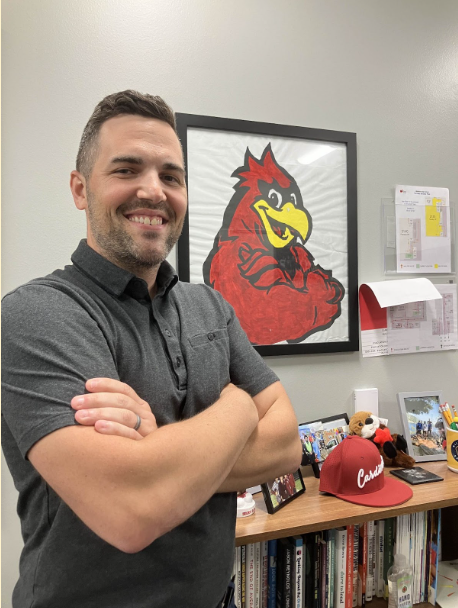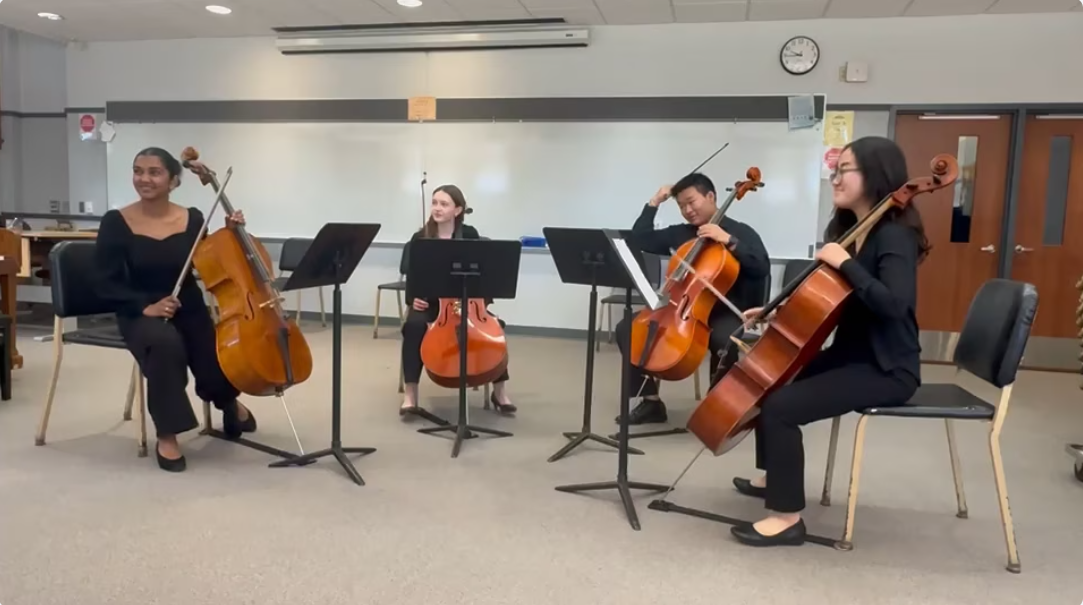Grieving Together: How to Get the Support You Need
November 11, 2021
It has been a month of tremendous loss and grief at Middleton High School. Dr. Julia Shah, psychologist at Haven Psychology, and MHS School Psychologist Amber Donnelly explained the grieving process, how students can support each other, and where students can get help.
Where to Get Help
MHS staff and outside professionals are ready and willing to help students with their grief, but they need students to reach out.
One of the resources students can use at the high school is Student Services. Student Services provides students with help in many areas: mental health, relationships, resolving conflict, study and executive functioning skills, post-secondary planning, and more.
To schedule an appointment, students can scan the QR codes outside the Student Services centers, which will bring them to the Calendly of psychologists, counselors and social workers in each house to sign up for a time slot. They can also talk to the administrative assistants at the front desk inside each Student Services center to schedule an appointment. If there is an urgent concern such as a safety issue, the front desk can often work students in to see someone that day.
A third option is accessing Calendly through the MHS website: under “Student Services” in the menu, go to “Student Support Centers,” and click on the “Schedule an Appointment” link under each house.
“Never be afraid to ask,” Donnelly said. “It’s okay to ask for help… It’s okay to not be okay — that’s why we’re here.”
Donnelly stressed that anyone in Student Services is ready and willing to talk with students about grief. If a student is struggling beyond what Student Services staff can support, they can also help connect them to an outside grief counselor or other resources such as an independent psychologist.
In the current pandemic, mental health services are over capacity, resulting in long waitlists for many services. Shah recommends getting on a waitlist right away and doing things to promote personal health while waiting for that first appointment.
“In the meantime, there are a lot of resources like self-help books for grief, work books, and informal things for self-care,” Shah explained. “Self-care is one of the biggest ways to process grief. Continue to take great care of yourself.”
If there is a safety concern demanding urgent care, see a primary care physician. Primary care appointments are less backed up, and physicians can provide support for urgent needs. “They are versed in the basics,” Shah said.
Signs Someone Needs Help
Grief is an individual process, and everyone has their own timeline. However, there are times when it is important to reach out to an adult or a professional for help. If your friend expresses the following thoughts or behaviors, Shah recommends talking to them about your concern and getting an adult involved. If you recognize the behaviors in yourself, reach out to a trusted adult for support.
Behaviors that warrant adult help:
- Talking about one’s own death or dying
- Talking about suicidal feelings or thoughts
- Engaging in reckless behavior
- Increased or dangerous use of drugs or alcohol
What Grief Looks Like
Grief is not linear. Things can feel different day to day, and at times, it can even be a minute-to-minute existence. Some days it is hard to carry a conversation or even to get out of bed, but some days will feel close to “normal,” and Shah said that is okay.
“Think of it like waves,” Shah explained. “There is no start point or end point. There is the person that we were before our loss happened and the person that we are now with the loss. We carry the loss with us and we’re forever changed because of it, because it’s part of our story now. And so the story changes us.”
These waves will look different for everyone, despite experiencing the loss of the same people, because loss is so personal. “Grief is as individual to the person as their relationship to the person they lost,” Shah said. “It’s a very unique, individual experience that really isn’t comparable to somebody else’s.”
Shah encouraged students to not compare their own grief to someone else’s. She also explained that everyone will have different needs from day to day, and that is normal.
On days you want to talk about the loss, do so. But it is also okay not to talk about it when you don’t feel like you can. Shah explained that it is healthy to set boundaries. “It is okay to be like ‘not today, later.’ Or to say, ‘I actually am really needing this right now,’” she said.
Grief is about moving forward. It may happen sooner for some than for others, but keep in mind: We don’t move on. We move forward.
It will not be a linear trajectory. The wave will carry you up and down, so it is okay to feel bad one day and good the next.
“Be able to honor the times that are horrible with the times that make us feel any shred of hope that things are going to get better,” Shah said.
Even so, feeling happiness and moving forward can cause a lot of guilt. Guilt is hard to talk about, but Shah reminds students, “Just because you’re feeling better doesn’t mean that this didn’t happen and that it’s not important.”
“It would be really unsustainable to be all-consumed by grief for a really long time, so try to be open to the feelings of guilt because that means that you’re probably having some normal feelings, some joyful feelings, that allow us to take steps forward,” she explained.
How to Take Care of Yourself and Your Friends
Talking about loss is important. Shah is especially concerned about teenage boys and emphasized the importance of expressing emotions.
“This is the land of extraordinarily uncomfortable feelings, and being able to talk about comfortable feelings first and then moving to ones that are a little bit harder is my advice,” Shah said.
She said a common emotion in situations like this one is anger, and it can be very difficult to experience anger alone.
“Being able to normalize that that is a very difficult emotion when it comes to grief [is important],” Shah advised. “Honestly, any emotion that is coming up right now would be deemed to be pretty acceptable.”
It is healthy to express emotions, and it is just as healthy and important to talk about them.
It can be hard to know what to say or do for people grieving a loss, and Shah stressed the importance of reaching out to friends after a loss in a way that is concrete and authentic.
“It’s incredibly hard to know what to say to somebody,” she said. “That’s really all you have to say: ‘I’m not sure what to say, but I want you to know that I care about you and I want you to know that I’m ready to be here for you when you’re ready.’”
When a person is ready for that support, set up something to do. Making plans is much more helpful than just offering your availability, because it can be hard for people to reach out and ask things of others. Shah recommends doing things that remind you of the person that you lost. Listen to a playlist, eat at a restaurant, or do an activity they loved.
If that does not feel like the right thing to do, just offer your presence.
“Niceties… rarely feel good for the person who is going through the loss,” Shah explained. “What feels good is just presence. Even if it’s just presence and silence.”
It is also okay to not help all the time. This again comes down to boundaries.
“When you’re ready to show up for somebody, do it. And when you’re not, that’s okay,” Shah said. When you need to be taken care of, ask for support.
Self-care is crucial when experiencing grief. To take care of yourself, make sure to have a consistent sleep routine and an exercise routine. Spend time with friends. Eat nutritious foods.
Resources
National Suicide Prevention Lifeline: 1-800-273-TALK (1-800-273-8255)
Dane County 24/7 Suicide Prevention Hotline: 608-280-2600 (Journey Mental Health Center)
Below are titles to books Dr. Shah recommends for teens experiencing a loss.
- “When a Friend Dies: A Book for Teens about Grieving & Healing” by Marilyn E. Gootman Ed.D.
-
“Weird is Normal: When Teenagers Grieve” by Jenny Lee Wheeler
- “Help for the Hard Times: Getting Through Loss” by Earl Hip
- “Grief Recovery for Teens: Letting Go of Painful Emotions with Body-Based Practices” by Coral Popowitz
- “Healing Your Grieving Heart for Teens: 100 Practical Ideas” by Dr. Alan Wolfelt
- “Straight Talk about Death for Teenagers: How to Cope with Losing Someone You Love” by Dr. Earl Grollman
Parents, teachers, and mentors might find “Teen Grief: Caring for the Grieving Teenage Heart” by Gary Roe to be a helpful resource.
Shah also recommends the following meditations:
- Gratitude and Self-Compassion Meditation by Trails to Wellness
- “It’s Okay to Feel This” Meditation by Crossfit Ireland
Journaling is another way to care for yourself. Click here for a daily wellness journal outline from Trails to Wellness.
Trails to Wellness also has a physical activity planning outline that Shah uses with her patients. For the outline, click here.
Grief is a process. Support others, take care of your needs, and Shah said to always remember that it will take time.
“Some days, just getting through the day is progress, and some days, getting a whole bunch of stuff done and feeling like you got a good shower in and you connected with your parents or with a friend was a good day,” said Shah “A good day can look very different depending on the day. That’s what grief is. It’s not linear.”













